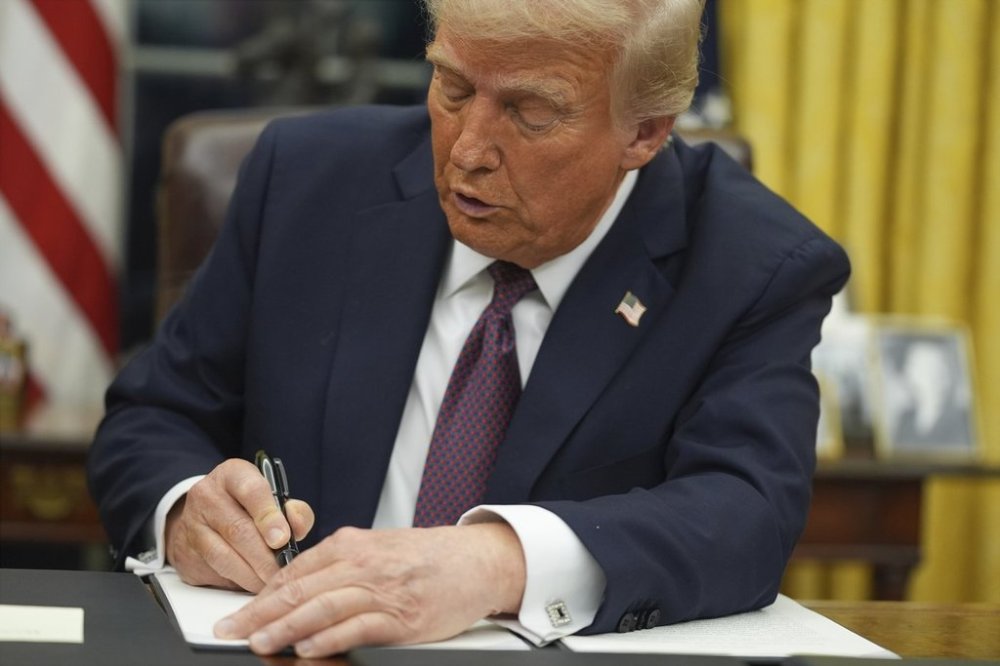Appeals court won’t lift block on Trump’s executive order attempting to end birthright citizenship
Advertisement
Read this article for free:
or
Already have an account? Log in here »
To continue reading, please subscribe:
Monthly Digital Subscription
$0 for the first 4 weeks*
- Enjoy unlimited reading on winnipegfreepress.com
- Read the E-Edition, our digital replica newspaper
- Access News Break, our award-winning app
- Play interactive puzzles
*No charge for 4 weeks then price increases to the regular rate of $19.00 plus GST every four weeks. Offer available to new and qualified returning subscribers only. Cancel any time.
Monthly Digital Subscription
$4.75/week*
- Enjoy unlimited reading on winnipegfreepress.com
- Read the E-Edition, our digital replica newspaper
- Access News Break, our award-winning app
- Play interactive puzzles
*Billed as $19 plus GST every four weeks. Cancel any time.
To continue reading, please subscribe:
Add Free Press access to your Brandon Sun subscription for only an additional
$1 for the first 4 weeks*
*Your next subscription payment will increase by $1.00 and you will be charged $16.99 plus GST for four weeks. After four weeks, your payment will increase to $23.99 plus GST every four weeks.
Read unlimited articles for free today:
or
Already have an account? Log in here »
Hey there, time traveller!
This article was published 11/03/2025 (273 days ago), so information in it may no longer be current.
A third appellate court has upheld a block on President Donald Trump’s executive order limiting birthright citizenship.
The 1st Circuit Court of Appeals made the ruling Tuesday, denying a motion from Trump’s legal team to immediately overturn a block issued by a federal judge in Massachusetts.
Trump’s executive order would block automatic citizenship for any child born in the U.S. to someone who is in the country illegally, as well as children born to someone with temporary legal status if the child’s father is not a citizen or legal permanent resident.

Roughly two dozen states have sued over the executive order, which they say violates the Constitution’s 14th Amendment promise of citizenship to anyone born inside U.S. borders.
But Trump’s legal team argues the Amendment, ratified 157 years ago after the end of the Civil War, only confers citizenship to people born under the jurisdiction of the United States — and they say jurisdiction isn’t always the same thing as being born on American soil.
At least half a dozen lawsuits over the order have been filed across the U.S. so far, though some of them have been consolidated. So far, judges have blocked Trump’s order in six of them while those cases move forward. Two cases are still awaiting rulings on requests to block the order, and one case has been placed on hold.
In Tuesday’s ruling, the appellate panel did not weigh in on the overall legality of the lower court’s block, but said that Trump’s attorneys didn’t prove that the block should be lifted right now.
The decision came in a pair of consolidated cases brought by New Jersey and 19 other states as well as organizations representing immigrants and a pregnant woman who is in the country legally with temporary protected status.
Attorneys representing the Trump administration had asked the circuit court to overturn the block placed by U.S. District Judge Leo Sorokin in Massachusetts, arguing that New Jersey and the other states and organizations that sued didn’t have the legal right, or standing, to bring the lawsuit in the first place.
But 1st U.S. Circuit Chief Judge David Barron, writing for the unanimous panel, said the government didn’t make any “developed argument” about why Trump’s executive order should be found legal.
The administration’s attorneys also failed to convince the court that the states and other plaintiffs lacked standing, Barron wrote. He cited the lower court’s finding that the states would suffer irreparable harm if the order went into effect, while blocking the order simply maintains the status quo.
___

